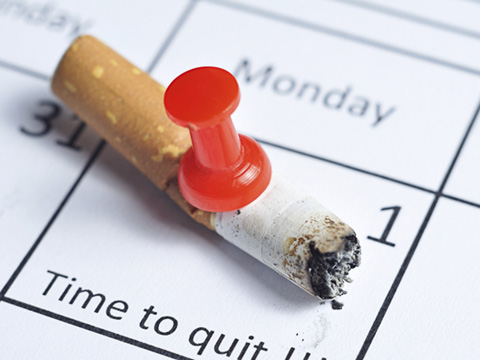Important tips:
- Support Person: The decision to stop smoking can elicit uncomfortable emotions. Ask someone who is available to you in the next few weeks to act as a sounding board and provide encouragement when needed.
- Affirmation: An affirmation is positive statement repeated often to create desired changes in your life. Repeating the affirmation helps not only to remind you why you are no longer smoking but also imprints a new image of health so that the body can then produce health. Examples: “I am a non-smoker. I make healthy choices in my life for myself and my family.”
- Set boundaries: Establish agreements with other smokers to refrain from smoking in your presence. This includes your spouse. When possible, stay away from smokers until you feel more confident with your nonsmoking health status.
- Drink water: Research shows that dryness causes cravings. Sip water frequently throughout the day.
- Refrain from drinking coffee: Research shows that coffee causes cravings and dehydrates the body.
- Food choices: The best diet during the withdrawal period is a hypoglycemic diet which maintains constant blood sugar levels and avoids food cravings. Meals should consist of fresh fruits, vegetables, proteins, and complex carbohydrates in six meals a day. Try to avoid sweets and baked flour products. Candy upsets the blood sugar level, which can aggravate smoking-withdrawal symptoms. Sugar substitutes, such as NutraSweet, are sweeter than sugar and cause further sugar cravings.
- Managing cravings: Cravings feel like they will last forever but actually fade in two minutes. Plan what you will do during a craving. Examples: Take your herbs; repeat your affirmation; breathe deeply; walk to another place; work on a project or hobby; call your support person. If you’re hungry have something to eat – it’s not a cigarette craving.
- Exercise Regularly: Exercise relieves stress, eliminates boredom, increases circulation, strengthens the respiratory system, and promotes detoxification of tissues. If you do not already have an exercise program, start one today.
- Hang in there! It is only a short time before your body is free from nicotine and the cravings end.
Stop Smoking Checklist
- Throw away all of your cigarettes – don’t just hide them or give them away.
- Change your daily routine. For example, if you usually smoke in the morning while reading the newspaper, try siting in a different place, reading something different or listening to music. This doesn’t mean don’t do the things you enjoy, just do them at different times of the day to develop a new non-smoking routine.
- Openly tell people that you have stopped smoking. This is an important affirmation and outward commitment to yourself and others that you are going to stop smoking. By telling your friends and family outright, they will be sensitive to your situation and openly support your decision. This proactive notice will also circumvent the uncomfortable situation of having to tell a smoker that you are trying to quit after they have already lit-up a cigarette.
- Thoroughly clear away all signs of smoking. Clean your house, car, ashtrays, and all other areas or items that have had contact with tobacco smoke. Schedule an appointment to get your teeth cleaned and a manicure to remove nicotine stains.
- Don’t try and stop all of your “bad habits” at once. If you have multiple harmful habits, start by stopping the least difficult first then move on to another. For example, if you eat a lot of sweets or drink an excessive amount of coffee (both of which can contribute to cigarette cravings), start by eliminating or reducing the one you have the least desire for. Once you have overcome your smaller hurdles you will be more prepared and confident to overcome the more difficult ones.
- If you smoke a cigarette don’t give up or feel guilty. Everyone slips now and then, we are creatures of habit and prone to mistakes. Because you make a mistake and have a cigarette, don’t feel like you lost everything and have to start from scratch. Realize your mistake, correct yourself, and move on. Once you have corrected your mistake, think positively: “Well, at least I only had one cigarette today, normally I would have smoked a pack by now.”
- Don’t tell others to stop smoking, instead focus on yourself. If you try to persuade others to stop smoking when they are not ready, it will only cause people to alienate you. Believe it or not, friends who smoke can be your biggest supporters. Maintaining these friendships can be very important, especially during a time when you need support and encouragement.
- Take time to acknowledge your efforts. Take a moment to congratulate yourself and your accomplishments. This is not being boastful or arrogant; it’s simply self-recognition.



